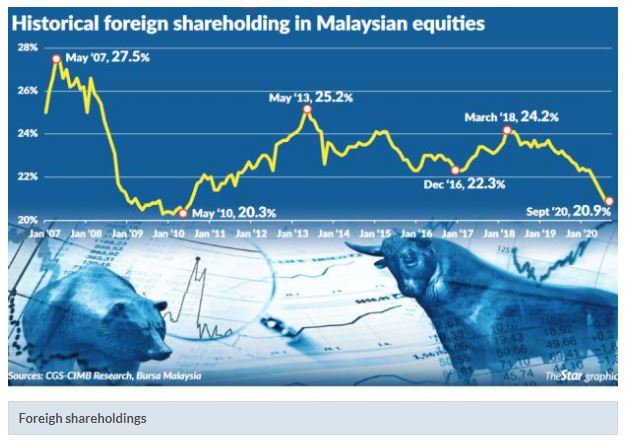Malaysia: No emergency for investors
PETALING JAYA: Investors let out a sigh of relief after a proposal to enact Emergency rule was denied but political uncertainties continue to shroud the economic and stock market outlook.
This uncertainty showed as across Bursa Malaysia, market breadth remained overwhelmingly negative yesterday even after the state of emergency had been averted. A total of 790 decliners trumped 256 gainers, while 423 counters were unchanged.
The benchmark index, the FBM KLCI, fell to an intra-day low of 1,482.15 points, but later pared most of its losses due to a last-minute surge.
By 5pm, the 30-stock index closed flat at 1,494.61 points, following a 4.16-point drop on Friday.
Heightened political turmoil, along with weak corporate earnings prospects, have worsened investor sentiment, especially among foreign funds. Foreign investors have been net sellers of Malaysian equities for most of this year, although this has been offset by net buying from local institutions and retail investors.
According to MIDF Research, foreign investors continued to be net sellers of Malaysian equities in the Oct 19-23 week, albeit at a slower pace of RM214.4mil.
“So far in 2020, foreign investors’ net selling has reached RM22.81bil worth of equities on Bursa Malaysia, ” it said in its weekly fund flow report.
In comparison, the net outflow of foreign funds for all of 2019 was only RM11.14bil.
Had an emergency been enforced, CGS-CIMB Research said it would have shaken consumer, business and investor confidence in the country, leading to lower growth prospects for the country and corporates.
“This decision likely averted a potential major sell-off in the market, arising from concerns over the negative impact that an emergency decree would have on the economy and corporate earnings.
“The King’s advice for MPs to not continue with any irresponsible action that could undermine the stability of the current administration could quiet political noise in the near term while his reminder on the importance of the 2021 budget, set to be tabled in Parliament on Nov 6, reduces the chances of the budget being shot down.
“Overall, this is a more favourable outcome for the Malaysian equity market than an emergency decree, but it may not be sufficient to reverse foreign investors’ net selling due to prevailing political uncertainty, ” the research house stated in a note.
Meanwhile, Maybank IB Research analyst Anand Pathmakanthan said net foreign selling would have accelerated had the King given the green light for an emergency rule.
“While Asean’s diversity of governance styles and issues is recognised, Bursa’s historical relative political stability premium is eroding, and without mitigating offsets (such as large, growth-attractive domestic market and expanding ‘new economy’ investment options), foreign equity flows will remain pressured.
“With domestic investors set to retreat to the sidelines, the FBM KLCI will struggle for support, especially as the most sizeable foreign holdings are in index heavyweights like finance and gloves, ” he said.
A local investment bank economist said the move to impose a state of emergency would have resulted in serious backlash. “Risk of rating agencies downgrading Malaysia would have started to grow as it signalled there was a combination of high economic and political risk.
“Foreign direct investments would have more likely stayed on the sidelines much longer than envisaged, ” he said.
Apart from the country’s ongoing political uncertainties, Malaysia also faces other headwinds especially the still-fragile economic recovery both domestically and globally with the resurgence of Covid-19 cases.
Economists expect Budget 2021 to provide further support to the economy and help accelerate recovery.
Speaking to StarBiz, Bank Islam Malaysia Bhd chief economist Mohd Afzanizam Abdul Rashid believes Budget 2021 will add on to the measures announced this year under the previous five rounds of stimulus packages.
According to him, the upcoming budget is expected to introduce measures that ensure stability in labour markets, capacity building via reskilling, promoting digitalisation among businesses and cash transfers to the bottom 40% (B40) and middle 40% (M40) population.
“We are experiencing multiple shocks at the moment with public health being the utmost concern and it remains to be seen whether the pandemic can be resolved in the immediate term.
“The International Air Transport Association indicated in July that global passenger traffic would only normalise in 2024. That would mean our tourism sector, which accounts for about 12.5% of gross domestic product based on tourist receipts and domestic tourism expenditure, will remain lethargic given its close link with other sectors, ” said Mohd Afzanizam, pointing out the challenges that could dampen Malaysia’s economic recovery.
Source: https://www.thestar.com.my/business/business-news/2020/10/27/no-emergency-for-investors


 Thailand
Thailand





